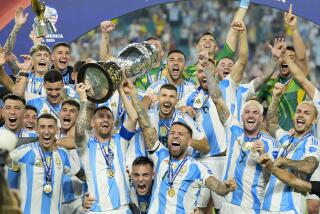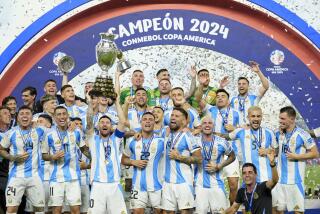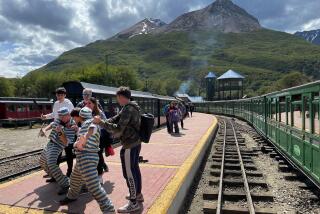THE WORLD CUP : ARGENTINA: Buenos Aires Awash as World Cup Party Runneth Over
- Share via
BUENOS AIRES — A blizzard fell Sunday over a city where snow is unknown. The ground shook in a metropolis where there has never been an earthquake.
Carlos Bernandez, a waiter at the Via Veneto bar, where nine patrons spent an anxious afternoon too nervous to drink, explained it all: “We scored that last goal. We never stopped believing. The winning goal was ours--it belongs to the Argentine people.”
Thus, with a little help from their friends, did King and Diego and his court bring joy to the kingdom.
It was tough. It was close. “It’s over ref, blow the whistle, ref, blow the whistle,” begged a television commentator as swarming green shirts scrambled for a last-gasp tie.
“Talk about nerves. Between the time the Germans tied and the time we went ahead again, I ate a mountain of cookies and a whole bag of peanuts without realizing it,” said Alberto Luzzi, a building superintendent. “At the end we were all crying.”
The World Cup came with explosion in the shank of a gray afternoon to a city clad for southern hemisphere winter.
Within minutes after the final whistle, streets empty even of stray dogs blossomed in blue and white pandemonium. A national block party for 30 million delirious souls, BYOB , played deep into the chill night.
A storm of confetti spilled from balconies and passing cars, papering streets deafened by horns, whistles, sirens, bells, drums, firecrackers, triangles, pot lids, screaming children and their dancing, jumping, shouting, chanting, elders. Cowbells seemed in particular fashion.
Argentines dressed in blue and white, wrapped modishly in their flag, crowded in the streets to salute honking motorists in blue and white, who had come to cheer the pedestrians. Police cruisers, with lights and sirens, whizzed about aimlessly.
Three deaths were reported in accidents stemming from the celebrations. A 22-year-old man was hit by a stray bullet in Buenos Aires, a man accidently was crushed in a crowd in the interior city of Tucuman, and a youth was hit by a car in the Buenos Aires suburb of General Pacheco, police said. Fifty arrests were also reported in the first three hours after the game.
The traffic jams were as monumental as the people jams, but no one seemed to notice. No one worked except itinerant flag and balloon salesmen, whose wares quickly vanished into the cheering maw, leaving them without much to do but to join hands with the nearest group of street dancers.
He didn’t score on Sunday, but the party belonged to Diego Maradona, the spark-plug striker who carried his lightly regarded team to the final. Sunday, the Germans guarded Maradona like the crown jewels, and he created opportunities for other Argentine attackers.
Thirty million experts saw how off-balance its preoccupation with Maradona left the West German defense. Thirty million of his subjects saw Maradona foil the Germans with a breathtaking pass that set up the winning goal.
“They covered and double-covered Diego, and still he made the best pass of the Cup,” Oscar Carrera enthused, waving to the passing cars.
Sunday’s celebrations paralleled those of eight years ago this month, when Argentina won its first World Cup in a game at home against Holland.
Sunday’s game evoked bitter memories for some. In 1978, Argentina was ruled by generals who caused thousands of people to “disappear” in combatting Marxist terrorism with state terrorism.
Jacobo Timerman, an Argentine editor jailed without charge by the military, will never forget that Sunday eight years ago. “We political prisoners were all Dutch that day,” Timerman recalled.
Sunday there were no Dutch in Argentina, and if there were any West Germans they kept quiet.
A portly Cabinet minister representing a democratic civilian government embraced the winners at Aztec Stadium with avuncular affection.
President Raul Alfonsin watched the game on television at home. He declined an invitation to Mexico, saying a country with severe economic problems such as his could not afford the luxury. Instead, he talked with Coach Carlos Salvador Bilardo and Argentina’s players by phone.
“All of Latin America should be proud,” Alfonsin said.
On Callao Street here Sunday, a smiling old man named Ignacio Biassa stood alone against the wall of an apartment building, outside the tumult.
“I have seen this before, in ‘78, and after elections but today is different,” Biassa said. “Today there is only one party, one country.”
More to Read
Sign up for Essential California
The most important California stories and recommendations in your inbox every morning.
You may occasionally receive promotional content from the Los Angeles Times.










